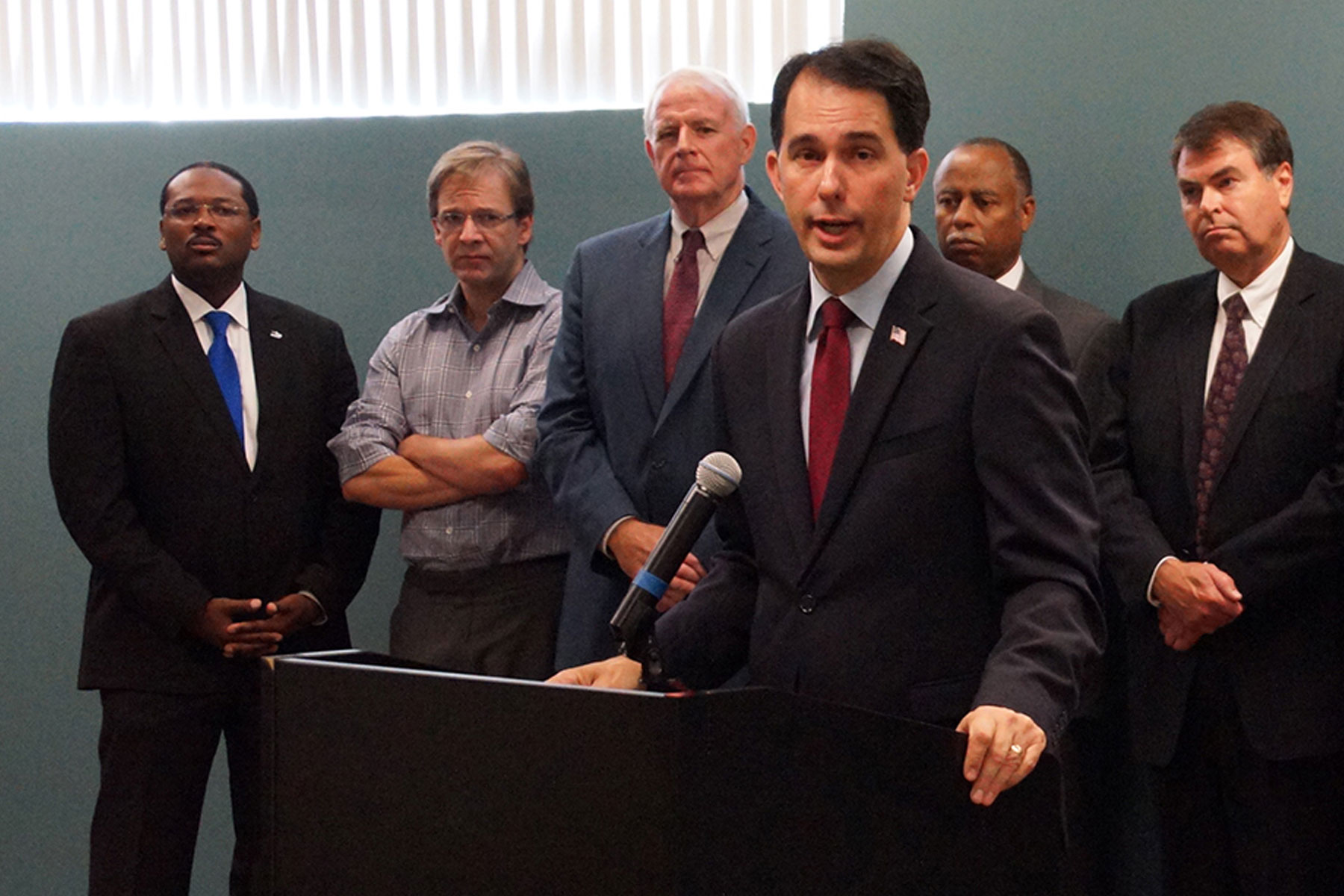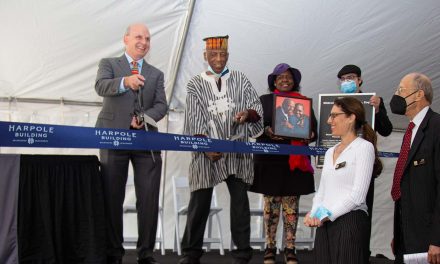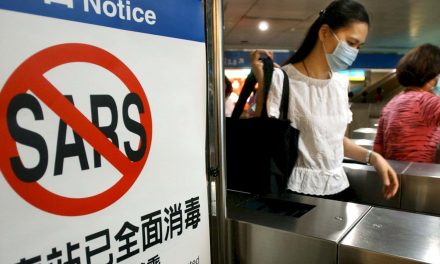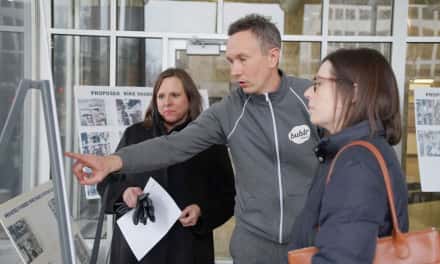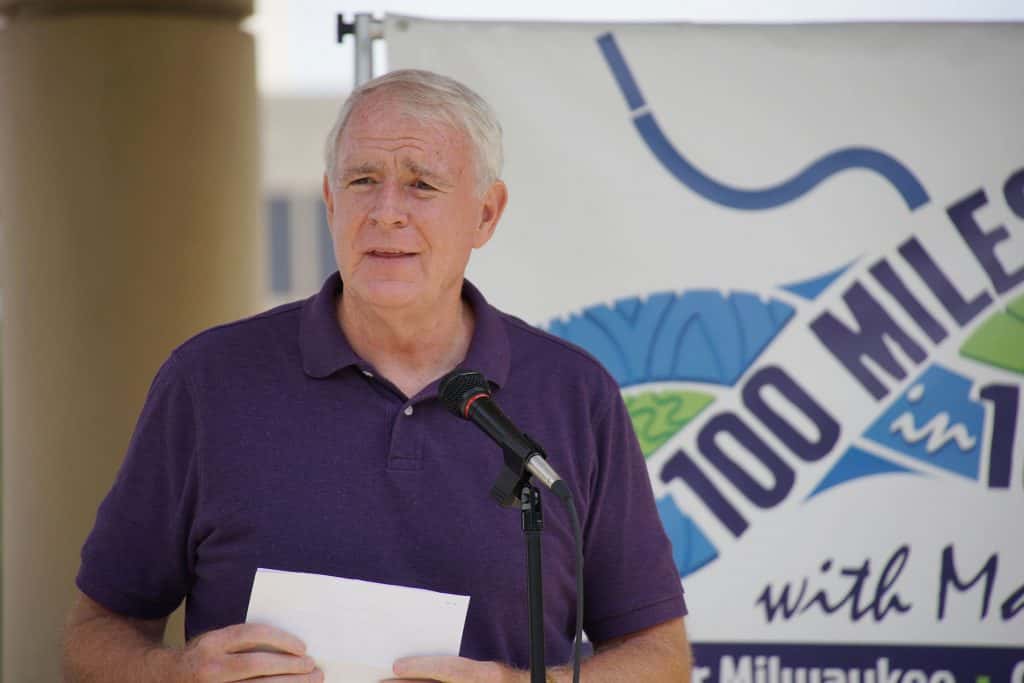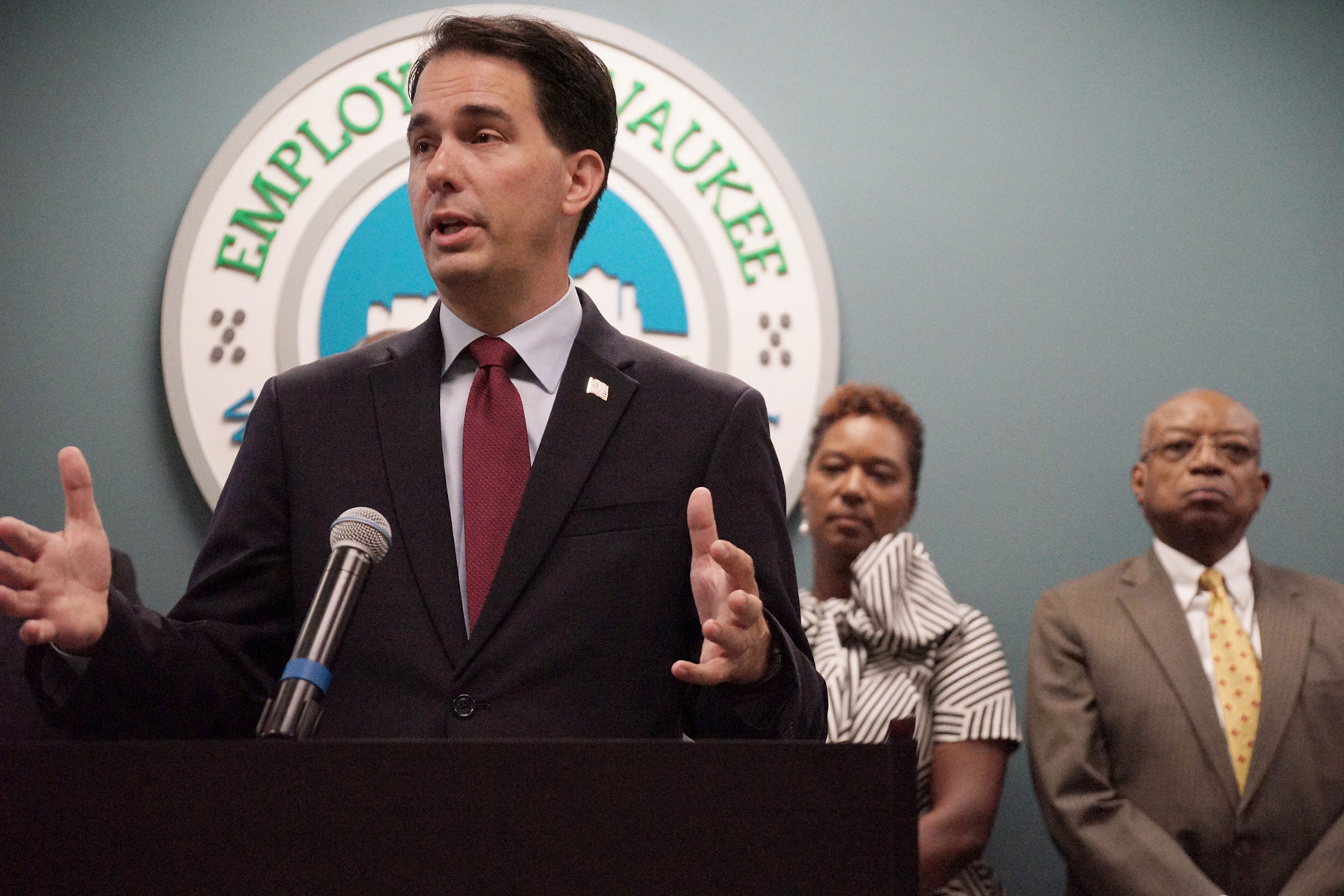
Governor Scott Walker, joined by state Cabinet officials, Milwaukee Mayor Tom Barrett, Milwaukee Council President Ashanti Hamilton, and Milwaukee County Executive Chris Abele, announced a joint economic and workforce development effort for the City of Milwaukee which includes an additional $4.5 million state investment on August 26.
The effort will center on raising awareness of existing programs and providing additional resources for employment and blight-elimination programs.
“Today’s announcement sends a message to the people of Milwaukee that we are here to help anyone who wants a job, find a job,” Governor Walker said. “At the state, we are going to utilize new methods to market job and health services for people who need them, and we are also going to make a significant investment in worker training. This is all about helping people move from government dependence to true independence through the dignity that comes from work.”
The state agencies involved in leading this effort are the Department of Children and Families (DCF), Department of Health Services (DHS), Department of Workforce Development (DWD), Wisconsin Economic Development Corporation (WEDC), and the Wisconsin Housing and Economic Development Authority (WHEDA). DWD Secretary Ray Allen and DCF Secretary Eloise Anderson are leading the state’s effort. The mission of these agencies is to increase the visibility of the state’s efforts to help those in need while utilizing existing programs and staff.
“We are working together to put resources into some of the most significant issues facing Milwaukee neighborhoods. With a focus on Sherman Park and adjoining areas, I want to initiate an effort that will address both the lack of job opportunities and the condition of neighborhood housing stock in a meaningful way,” Mayor Barrett said. “Together with our neighborhood partners we can build on work that has been underway and leverage additional federal and private investments.”
“My highest priority for more than a year has been tackling the root causes of systemic poverty and institutionalized racism,” said Milwaukee County Executive Chris Abele. “While it’s incredibly upsetting that it took another tragedy to create a true call to action throughout our community, I’m encouraged by the efforts of state and local leaders. I look forward to partnering with Governor Walker and Mayor Barrett on this new development effort, as well as the county’s existing efforts such as the Office on African American Affairs and our successful UpLift MKE job training program.”
Highlights of the Effort:
- The state, through DCF, will allocate an additional $1.5 million in TANF (Temporary Assistance for Needy Families) funds to partner with the city of Milwaukee for employment programs for eligible individuals who want a job.
- The state will provide $2 million to assist in the demolition, deconstruction, and rehabilitation of foreclosed and blighted properties in the city of Milwaukee.
- The state, through DWD, will allocate $1 million of Wisconsin Fast Forward funds to employer-based job training programs for the city of Milwaukee.
- DWD’s Division of Employment & Training has prepared “Mobile Response” equipment with laptops, routers, peripheral equipment, etc., to establish job seeker assessment and career counseling services at various locations in the area in partnership with Employ Milwaukee and other state partners.
- WEDC is engaged with the city of Milwaukee and others about the possibility of providing assistance to the businesses affected during the civil disturbances in Sherman Park.
Comprehensive Overview of Immediate Actions:
Department of Children and Families
- DCF will allocate an additional $1.5 million TANF funds to partner with the City of Milwaukee for employment programs for eligible individuals who want a job.
- Transform Milwaukee Jobs Program (TMJ): Representatives from TMJ partner agencies at mobile response locations to give information and take applications for TMJ program.
Department of Financial Institutions
- The state of Wisconsin will provide $2 million to assist in the demolition, deconstruction, and rehabilitation of foreclosed and blighted properties in the City of Milwaukee. The program will be administered in a partnership with the city and the state. There will be matching funds from the city. In 2013, with $2 million provided by the state and $1.1 million from the City of Milwaukee, 205 properties were demolished. The funds will be made available by the Attorney General from the settlement dollars obtained by Department of Justice.
Department of Health Services
- Employment and Job Training Assistance for FoodShare members: DHS will work with ResCare, our FoodShare Employment Training (FSET) vendor to have an FSET staffer on-site of the mobile response to help direct FoodShare members to the FSET program, to eliminate barriers to employment and reduce dependence on government programs.
- Substance Use and Abuse Education, Prevention and Treatment: DHS will work with partners at the county level to offer guidance for those who are affected by addiction or substance use or abuse (including alcohol and heroin), including enrollment in CCS. Comprehensive Community Services (CCS) is a program for individuals of all ages who need ongoing services for a mental illness, substance use disorder, or a dual diagnosis beyond occasional outpatient care, but less than the intensive care provided in an inpatient setting. The individual works with a dedicated team of service providers to develop a treatment and recovery plan to meet the individual’s unique needs and goals. The goal of this community-based approach is to promote better overall health and life satisfaction for the individual.
- Mental Health Services: DHS will work with partners at the county level to offer screenings and guidance for those who are affected by mental illness, including enrollment in CCS.
- Healthy Families Promotion: DHS will work with partners at the county level to promote Women, Infants, and Children (WIC) services, which promote good nutrition for women, infants, children. WIC provides nutrition education, breastfeeding education and support, supplemental nutritious foods, and referrals to other healthy and nutrition services.
Department of Workforce Development
- The department will support the Discretionary Grant Application of the city of Milwaukee and Employ Milwaukee to the US Department of Labor Secretary and the US Department of Housing and Urban Development to engage job seekers in communities with skills assessment and counseling services.
- Allocation of $1 Million of Wisconsin Fast Forward funds to Employer-Based Job Training Programs for the city of Milwaukee. Governor Walker will announce a specific round of Fast Forward grants available to provide state worker training in the city of Milwaukee. This could include grants for both adults and youth in the city of Milwaukee.
- These items are in addition to standard federal Workforce Innovation and Opportunity Act (WIOA) Title I services, Wagner-Peyser funded services, Unemployment Insurance (UI) services, and other program services that are routinely available to Milwaukee-area job seekers and employers.
- Provide an Access Point for Job Seekers: DWD’s Division of Employment & Training (DET) has prepared “mobile response” equipment with laptops, routers, peripheral equipment, etc., to establish job seeker assessment and career counseling services at remote locations in partnership with Employ Milwaukee and other state partners. The equipment is imaged to access JobCenterofWisconsin.com, assessment tools, and the VPN network to enable staff and counselors to provide services when request at non job center locations in Milwaukee neighborhoods.
- Additional state agency services to be included.
- Vocational Rehabilitation Response Strategies:
- Department of Vocational Rehabilitation (DVR) staff will identify current DVR job seekers/consumers in defined area, including those youth in area high schools, and offer support and services within DVR’s scope, and information and referral to services offered by other state/community agencies. This applies to both DVR General and DVR PROMISE programs.
- DVR staff will identify mental health services from culturally competent organizations that provide holistic services and therapeutic practices such as trauma informed care, treatment of post-trauma stress disorder, child and adolescent therapy, coping strategies, case management services and care coordination.
- Once access points have been identified in the Sherman Park community, DVR will contribute staffing resources to provide information about DVR services; conduct DVR eligibility determinations, and offer soft skills training opportunities, interview and resume preparation workshops, and on-site recruitments for employers in the city and area that need to fill immediate job openings.
- DVR business services consultant staffing resources will work in collaboration with the Employment Milwaukee business services team and other workforce development partners to identify employers and connect dislocated workers to employment opportunities in the city of Milwaukee and the greater Milwaukee area.
Wisconsin Economic Development Corporation
- WEDC is engaged with the city of Milwaukee and others about the possibility providing assistance to the businesses that were affected during the disturbances in Sherman Park.
- WEDC will focus on working with its many partners who serve the city of Milwaukee, including the minority chambers of commerce and the Wisconsin Women’s Business Initiative Corporation (WWBIC) to identify programs available to assist small businesses and entrepreneurs.
Wisconsin Housing and Economic Development Authority
- WHEDA Housing Resource for Milwaukee Northside Mobile Stations: For those in need of stable housing, a WHEDA resource that can be promoted as part of the neighborhood mobile stations would be: www.WIhousingSearch.org. WHEDA, along with the Department of Health Services and the Department of Administration, Division of Housing, teamed up to offer this website for state residents. The website is a free resource for persons looking for an affordable place to rent and also has a valuable database of resources for homelessness, people with disabilities, homeownership, public housing, and other social services.
- WHEDA Foundation Housing Grant Awards. WHEDA will announce that the WHEDA Foundation, Inc. is awarding $102,470 in housing grants to six special‐needs housing providers in the Transform Milwaukee corridor. These grants, awarded during WHEDA’s annual Housing Grant Program competition, help housing providers build new facilities or make improvements to their existing facilities.
- Rebuilding Together Greater Milwaukee ($25,000), WestCare Wisconsin, Inc. ($25,000), United Community Center ($25,000), Social Development Commission ($10,000), The Salvation Army ($10,000), and Cathedral Center, Inc. ($7,470) for a total of $102,470 in grants. From these six grant recipients, four will be using grant monies to provide updates to their existing facilities and two are providing assistance to Milwaukee residents:
- Social Development Commission will use WHEDA grant monies to repair homes for low-income Milwaukee County residents seeking to use the Weatherization Assistance Program.
- Rebuilding Together Greater Milwaukee will use WHEDA grant monies to provide critical home repairs/emergency repairs to elderly low-income homeowners and veterans in Milwaukee.
- Entrepreneurship Training Grant Announcement of $380,000 to Dedicated Partners that Provide Training to Support Entrepreneurship and Job Creation in the city Of Milwaukee.
- $200,000 for Operation Dream, which offers an entrepreneurship training program for African-American males ages 11 to 18 living in Milwaukee neighborhoods. The training program is designed to guide older boys into responsible adulthood and independence through employment and leadership.
- $100,000 for Asset Builders, to be used for the Go4it program, which is an entrepreneurship training and business accelerator program currently operated through a series of workshops for youth ages 16 to 24. The grant funding will enable the Go4it program to be offered specifically to Milwaukee teenagers ages 16 to 18 as well as allow participants to receive counseling and technical assistance. The Milwaukee specific training will focus on four industry sectors: finance, media, health, and trades.
- $80,000 for BizStarts, which offers a program called BizForge. The program starts with an intake session to identify where an entrepreneur is in the process of developing a business. The participant is then mentored by Bizstarts with lessons in marketing, sales, and business planning. Funding for this program will allow the program to hire additional staff to reach and serve more Milwaukee- area entrepreneurs.

